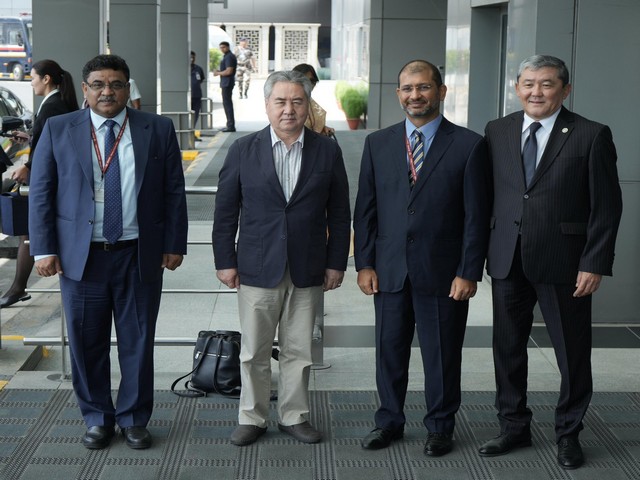
New Delhi: Zheenbek Kulubaev, Foreign Minister of the Kyrgyz Republic, arrived in New Delhi on an official visit to participate in the fourth meeting of the India-Central Asia Dialogue, scheduled for June 6.
Randhir Jaiswal, the Official Spokesperson for the Ministry of External Affairs, posted on X: "Welcome to India, FM Zheenbek Kulubaev of the Kyrgyz Republic. FM Zheenbek Kulubaev is on an official visit to India to participate in the 4th meeting of India-Central Asia Dialogue."
https://x.com/MEAIndia/status/1930484854023495896
Kulubaev is among the five visiting Foreign Ministers from Central Asia who will attend the Dialogue hosted by India's External Affairs Minister S Jaishankar. The visiting ministers will also take part in the India-Central Asia Business Council meeting on June 5, organised by the Ministry of External Affairs in collaboration with FICCI.
Since the establishment of diplomatic relations in 1992, India and the Kyrgyz Republic have exchanged several visits at a high political level. PM Modi has had visits to the Kyrgyz Republic recently in June 2019, with one earlier in July 2015.
The India-Central Asia Dialogue, launched in Samarkand in 2019, is a key ministerial platform aimed at strengthening ties between India and the Central Asian countries - Kazakhstan, Kyrgyz Republic, Tajikistan, Turkmenistan, and Uzbekistan. The earlier editions of the Dialogue have focused on regional security, counter-terrorism, connectivity, and economic cooperation. This year's meeting is expected to build on those priorities, with discussions on trade, infrastructure, technology, and joint development initiatives.
India shares centuries-old cultural and historical connections with the Central Asian region. Buddhism spread from India through Tibet to Central Asia, leaving a spiritual legacy visible at key sites such as Kara Tepe, Fayaz Tepe, and Adzhina Tepe. Indian monks helped translate scriptures and establish monasteries across the region, forming the early basis of engagement.
Following the independence of the Central Asian countries after the breakup of the Soviet Union, India was among the first to establish diplomatic ties in 1992. Over the years, relations have expanded to include strategic partnerships - signed with all five countries except Turkmenistan - as well as collaboration in defence, education, and development.
Prime Minister Narendra Modi's visit to all five Central Asian nations in 2015 gave a major boost to bilateral ties. His participation in successive Shanghai Cooperation Organisation summits in Tashkent, Bishkek, and Samarkand further reinforced India's outreach. The first India-Central Asia Summit, held virtually in January 2022 and attended by the Presidents of all five nations, led to the adoption of the Delhi Declaration, institutionalising biennial summits and regular ministerial dialogues.
Defence and security cooperation are core pillars of this partnership. India holds annual military exercises such as "KazInd" with Kazakhstan, "Khanjar" with Kyrgyz Republic, and "Dustlik" with Uzbekistan. Training programmes for Central Asian defence personnel and deployment of Indian military training teams have deepened military-to-military ties.
India has also supported development in the region through grant-funded projects and educational exchanges. Around 6,500 ITEC training slots and 1,500 ICCR scholarships have been offered to Central Asian students and professionals. India has also built IT centres and funded infrastructure projects across the region.
Despite growing cooperation, trade volumes reached a peak of USD 3 billion in 2019-20 and falling to around USD 1.2 billion in FY 2024-25. India has invited Central Asian countries to participate in initiatives like the International North South Transport Corridor and Chabahar Port development to address connectivity challenges.